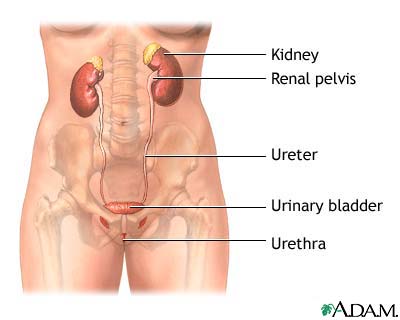Treatment
The goals of therapy are to:
- Improve symptoms
- Prevent the spread of infection
- Eliminate the cause of infection
Antibiotic therapy should target the bacteria causing the infection. In some cases, antibiotics may need to be given through a vein (by IV). You may take pain relievers (including pyridium, which works on the urinary tract) along with antibiotics.
People with urethritis who are being treated should avoid sex or use condoms during sex. If an infection is the cause of the inflammation, your sexual partner must also be treated.
Urethritis caused by trauma or chemical irritants is treated by avoiding the source of injury or irritation.
Prognosis (Expectations)
With the correct diagnosis and treatment, urethritis usually clears up without any complications. However, urethritis can lead to permanent damage to the urethra (scar tissue called urethral stricture) and other urinary organs in both men and women.
Complications
Men with urethritis are at risk for the following complications:
- Cystitis
- Epididymitis
- Orchitis
- Pyelonephritis
- Prostatitis
- Urethral stricture
Women with urethritis are at risk for the following complications:
- Cervicitis
- Cystitis
- Ectopic pregnancy
- Fertility problems
- Miscarriage
- Pelvic inflammatory disease (PID)
- Pregnancy complications
- Pyelonephritis
- Salpingitis (infection of the ovaries)
Calling Your Health Care Provider
Call your health care provider if you have symptoms of urethritis.
Pictures & Images
Female urinary tract
-
Urethral stricture: Overview, Causes
-
Urethral stricture: Symptoms & Signs, Diagnosis & Tests
-
Urethral stricture: Treatment
Review Date : 9/7/2008
Reviewed By : Linda Vorvick, MD, Seattle Site Coordinator, Lecturer, Pathophysiology, MEDEX Northwest Division of Physician Assistant Studies, University of Washington School of Medicine; and Louis S. Liou, MD, PhD, Assistant Professor of Urology, Department of Surgery, Boston University School of Medicine. Also reviewed by David Zieve, MD, MHA, Medical Director, A.D.A.M., Inc.
